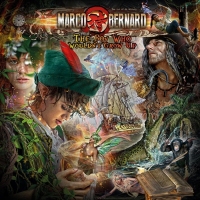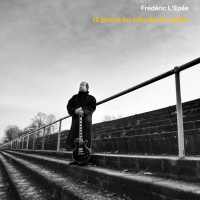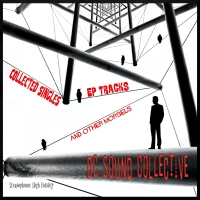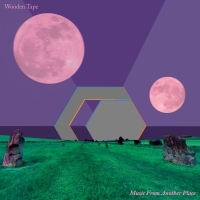Featured artists: Marco Bernard | Ingrid Lukas | Frédéric L’Épée | DC Sound Collective | Wooden Tape ||:
In this ADA update of bite-sized reviews we take a look at some of the recent albums from:
-
• Marco Bernard — The Boy Who Wouldn’t Grow Up
• Ingrid Lukas – Elumeloodia
• Frédéric L’Épée – 12 Pieces for Solo Electric Guitar
• DC Sound Collective – Collected Singles, EP Tracks and Other Morsels
• Wooden Tape – Music From Another Place
Bob Mulvey

The Boy Who Wouldn’t Grow Up follows in the footsteps of recent Marco Bernard and Kimmo Pörsti (The Samurai of Prog) concept albums exploring fictional children’s literature or fairy tales – Jonathan Swift’s Gulliver’s Travels (2020), stories from the Brothers Grimm and Daniel Defoe’s Robinson Crusoe (2021) spring to mind. For this latest release their attention is turned to J. M. Barrie’s 20th Century fictional work centred around the mischievous Peter Pan.
Curiously, the album cover is credited solely to Marco Bernard, however the music is firmly cast in the flamboyant, full- blooded Samurai of Prog mould. The sumptuous artwork is by Ed Unitsky, Kimmo Pörsti and Steve Unruh are present, along with a thirty-plus cast of regulars and occasional contributors. Musically, we are in familiar territory, recalling the halcyon ’70s era of progressive music with Genesis, ELP and Rick Wakeman noticeably present. The tracks are full pomp and ceremony, with grandiose arrangements, replete with swirling Hammond’s, vintage keyboards and synths, themed guitars, much flutiness, violins and hooks ( 😉 ) aplenty.
There is also a strong cast of vocalists, including John Wilkinson, who adds a Gabriel/Collins flair during the Alessandro Di Benedetti composition Never Never Land. Bo-Anders Sandström does a similar job during the album closer, Lunar Boy (“Asylum” Reloaded). Cam Blockland, Audry Lee Harper and Steve Uhruh offer the dialogue (Peter Pan, Wendy & The Lost Boys) during The Home Under the Ground, which is a tad music hall for my tastes, but it does ensure the storyline is suitably tied into the music.
Fans of The Samurai of Prog and the Bernard & Pörsti side projects can buy without hesitation. For those still to dip their toes into the TSoP camp, The Boy Who Wouldn’t Grow Up is as good a place to start.
Bob Mulvey

Elumeloodia is the fourth album from Estonian pianist, singer and composer Ingrid Lukas, who, according to the accompanying press-kit, has a sound that oscillates between jazz, folk and pop. The jazz, I would suggest, is subtly embedded within the minimalist and ambient soundscapes, the folk is steeped within the traditions of her Nordic and Estonian backgrounds, whilst the pop sensibilities arrive via the keyboard textures and fluid electronic rhythms.
Ingrid possesses a wonderfully clear and pure voice, one which can be both delicate and tender, but with the dynamic strength to soar across those climactic, cinematic passages which form such a crucial part of the music. At times she will whisper into your ear or conversely ring loud and sonorously clear – drenched in cavernous reverbs. On Elumeloodia, Ingrid has chosen to sing half of the album in her native tongue, which works really well, and there are numerous wordless passages.
Elumeloodia strikes me as very cathartic, personal album. Empowering, as we find in the album’s opening track, Dignity, with the words “minu väärikus on puutumatu” (my dignity intact) echoing in the distance. Powerful indeed! Equally powerful is her charming and restrained version of the traditional Estonian folksong Pill Oll` Helle, a particular favourite from the album, which sees the song build to a thunderous crescendo.
So far I’ve not touched upon the excellent musicians and vocalists who, in the main, sit inconspicuously around Ingrid. The empathy they show across the album is wonderfully understated, but absolutely paramount. The aforementioned Pill Oll` Helle, and particular note for the synth led Beginning, which lays foundation for the accompanying angelic layered, wordless voices. Those voices are particularly spectacular in the swirling Free Your Voice, and remain for the closing track Say It Out Loud.
Another hugely atmospheric, imaginative and absorbing album from the Ronin Rhythm Records label, always a source of creative music.
Bob Mulvey

The self-explanatory 12 Pieces for Solo Electric Guitar is, in the truest sense, a solo album with guitarist Frédéric L’Épée performing solo etudes on electric guitar. Now, if you’re not a guitar aficionado then the album title may not have piqued your interest, however I fear you may well have passed by this little gem unknowingly.
Before moving onto the album in hand, here’s a ‘potted’ history of French composer and guitarist Frédéric L’Épée – founding member of Shylock, who released two instrumental albums in the late-’70s, Gialorgues and Île de Fièvre. Between 1987 and 1998, L’Épée can be found in the excellent Philharmonie trio, releasing five albums. The early ’00s saw the formation of the fascinating Yang, again four albums thus far, the latest Designed for Disaster, released in 2022 and Yang’s first album to feature vocals, was well received by fellow TPA writer Graham Thomas. Along with these, and founded in 2012, is an electric guitar ensemble e – w e r k.
Returning to this latest offering, the album opens with the first of four performances of Etude N°1 for electric guitar – the following three being ‘variations’. Played at a spritely tempo and with constantly shifting meters, the music is strangely hypnotic, and in some respects akin to Robert Fripp’s Discipline era King Crimson. Here L’Épée has taken Fripp’s parts to a new level. As might be expected, the Variations offer differing interpretations.
Following the Etude N°1, L’Épée performs Descending, which employs the Robert Fripp pioneered NST (New Standard Tuning)… a short but lovely piece. Across the album L’Épée puts the electric guitar through its paces, Etude N°2 is a full-flight excursion in a similar vane to the opener, whereas the sparse and slightly jarring A Short Story about Gravity does bring things down to earth. Grave is solemn but rather engaging…
The oddball piece is the album’s free-form closer, Twists and Turns. It is the first track where the pre-gain is noticeably cranked up, and although it lives up to its title, it is somewhat of an acquired taste. Interesting, however, to hear L’Épée cut loose in this challenging improv epic.
A fascinating and intriguing album and not just for guitar connoisseurs…
Bob Mulvey

Portland, Oregon songwriter and multi-instrumentalist Daniel Crommie returns with the follow-up to the ambitious double album Perihelion Chronicle / Journey to the Aphelion (2022). Employing an eclectic mix of sounds, hypnotic rhythms and ambient textures, the double release utilised its two-plus hour duration to explore and create an ever evolving landscape. Spanning the period 2013 to 2022, and as the new album title implies, this latest ‘compilation’ release features newly remastered singles, EPs, etc. culled from DC’s back catalogue. Comprising of seventeen tracks, four are previously unreleased and, as might be expected, shorter and ‘single’ length in duration.
The songs still retain Daniel’s colourful instrument palette and rhythmic ingenuity, however there’s a few ‘new’ styles employed – from ’60s psychedelic pop to late-’70s/early-’80s synth pop. Also to be found are a couple of rockier numbers, equally dub, urban beats and even acid jazz are thrown in for good measure, a prime example being the two versions of the catchy Just A Millionaire. The most significant change, however, is that the album is predominantly vocal and, as there are no credits to suggest otherwise, I’m assuming the vocals are tackled by Daniel. They work in varying degrees of success for me. The aforementioned Just A Millionaire is very successful, as are the softly delivered lyrics in the pleasing and atmospheric Hesperus. The material also lends itself to the half sung, half spoken and ‘studio manipulated’ techniques, which works effectively and can be picked up in track one, the impressive Be My Monkey.
Collected Singles, EP Tracks and Other Morsels turned out to be a rewarding insight into the work of (DC) Daniel Crommie. The ‘Collective’ contributions are not listed, however as there’s some tasty fretless bass across the album, I’m assuming Eldon Hardenbrook has had some input (he’s there on the first track). I believe it is former Jade Warrior guitarist Colin Henson who adds the fine solo to the close out track Rowena, which combined with Daniel’s superb flute makes this a standout track for me. A few tracks have congas and bongos so Dave Thatcher may be there?
Bob Mulvey

I’m not entirely sure what attracted me to this release from Tim Maycox (Wooden Tap). I suppose the process took me back many years, where record shops were plentiful, and the countless hours spent browsing through the album covers wondering what joys, or miseries, might be lurking inside. In those days it may have been a brief editorial in Melody Maker, or more likely the album cover that piqued the curiosity. Once chosen, a trip to the counter with the burning question “Can I hear a track from this please?” So during those early years I ended up with a fair few abysmal albums with killer opening tracks…
So to the Wooden Tape album. I suppose reading the brief press release, which suggested that the tracks were based on Tim’s memories of children’s television themes from the ’70s and ’80s, was the initial spark, followed by watching the charming animated video for the track Geodesic Eric – not track one 😉 . Tim’s gentle multi-layered guitars, electric piano and sympathetic, mellotron sounding keyboards were intoxicating and boded well for the rest of the album. And Tim uses a similar musical formula across the album, utilising a multitude of guitar effects to add further depth of colour. Along with the seamless blending of keyboards and electronics the end result is rather endearing.
Now not all children’s TV was ‘cute’ and there are a couple of tracks that challenge; the opening of Broken Tapestry certainly wakes you up, whilst the six-minute, three-part Music for A Sun Chariot I-III, allows for greater exploration. Did I hear reference to any childhood TV theme tunes? Nope. Not sure this was Tim’s intention, more the recalling of an era and interpreting it via the rubric of ‘forgotten’ soundtracks.
Enjoyable, certainly worth investigating… and it’s ALL on Bandcamp (linked below)… so more than just the opening track to help you make your decision…

